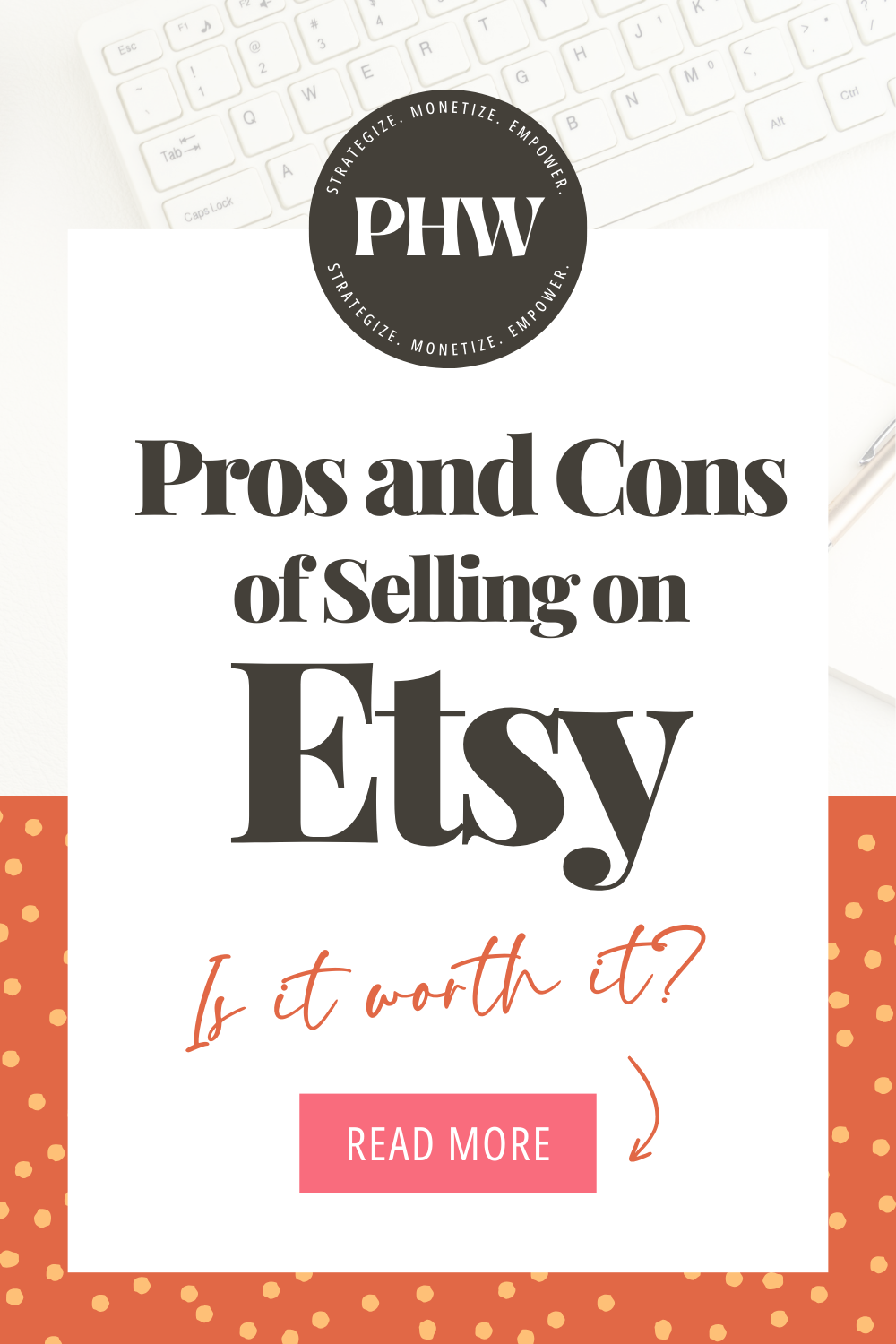If you’re into creating, and crafting, or have a love for vintage, you’ve probably thought about opening an Etsy shop.
Known for its creative freedom and access to millions of potential customers, Etsy is popular among aspiring entrepreneurs.
But is it really as perfect as it appears?
Let’s take a closer look at what selling on Etsy is like and determine if it’s the best fit for you and your brand.
Related Reading:

The Pros of Selling on Etsy
Wide Audience Reach
Etsy attracts millions of buyers worldwide, making it a prime spot for craft sellers.
Its global reach means you can sell beyond local markets to customers who love handmade items.
The platform’s search and recommendation features help get your products seen by the right people.
An Established Platform
Etsy has been around for a long time, earning trust from consumers. Selling on this established platform means you don’t have to start from zero to build credibility.
Customers come back to shop on Etsy because it is easy to use and has high-quality products.
This helps increase your sales and build a good reputation as a seller.
Low Startup Costs
Etsy stands out because it’s affordable to start selling on it. You don’t need a lot of money upfront like you would for your own website.
Etsy has small fees for listing products and doesn’t charge a monthly subscription.
This is great for new entrepreneurs who want a low-cost way to try selling online and learn about e-commerce.
Community Support
The sense of community among Etsy sellers is unparalleled.
Etsy is a supportive community where artisans and sellers have each other’s backs.
It offers resources, forums, and Etsy Teams, making it a place where sellers can connect, exchange tips, and support one another.
This shared knowledge and mentorship are priceless, particularly for newcomers.
Brand Exposure
When you join Etsy, you immediately tap into a huge base of potential buyers.
The site’s SEO and marketing tools can boost your visibility, a tough task when you’re on your own.
By using effective product descriptions and tags, you can improve your chances of appearing in organic search results.
The Cons of Selling on Etsy
High Competition
Etsy’s a double-edged sword for its sellers. Yes, you’ve got millions of active buyers just a click away, but guess what?
So do your competitors.
Some areas are so packed, standing out feels like shouting in a storm. Sellers have to really dig deep, spending time and effort to make their shops pop from the crowd.
Fees and Charges
Starting on Etsy is affordable, but remember, they take a portion of your sales through listing, transaction, and payment processing fees.
These fixed costs can reduce your profits, particularly for cheaper items. This might be discouraging for sellers focused on selling in large quantities.
Limited Brand Control
Etsy limits how much you can customize and brand your shop to keep the marketplace unified.
You can’t completely tailor your shop to showcase your brand’s unique identity, which might hinder your ability to stand out.
This restriction on customizing how your store looks could be a major issue for anyone who prioritizes brand uniqueness and customization.
Rule Changes and Policies
Etsy, like many big companies, often updates its terms and conditions.
Sellers need to keep an eye on these updates because they could affect how you manage your shop.
In the past, unclear rules and uneven policy enforcement have caused confusion and frustration among sellers.
Dependency on Etsy
Etsy’s future success isn’t a sure thing.
As a seller, you’re tying your success to theirs. Changes in how products are found, fees, or big business strategy shifts can affect your sales.
Depending solely on Etsy for income makes you vulnerable to these changes, and you won’t have much control over them.
Should I Sell on Etsy or my own website?
Choosing between selling on a platform like Etsy or having your own website is important, each option has its benefits and drawbacks.
Benefits of Your Own Website
- Complete Brand Control: Your website is an open canvas to shape your brand’s identity, design, and communication with customers, free from third-party rules.
- Direct Customer Relationships: With your own site, you can talk directly to your customers, collect their info (following privacy laws), and manage the sales process without middlemen.
- Possible Lower Costs: Starting a website needs an upfront investment, but over time, you might save money due to no listing fees, transaction fees, or commissions, which is more economical as you grow.
- SEO Advantages: Having your site allows for search engine optimization tactics to draw in organic traffic, a big plus over competing with others on the same marketplace platform.
Drawbacks of Your Own Website
- More Responsibility: More control means you’re in charge of website upkeep, security, and customer service, which might be tough without tech experience.
- Need for Marketing: Without a marketplace’s built-in audience, you’ll have to work harder to get people to your site through SEO, content marketing, social media, and possibly ads.
- Upfront Costs: Professional websites come with initial costs like domain name, hosting, design, and development, necessitating an upfront investment.
- Longer to Get Started: Creating a website from scratch or with a builder takes time, which can delay your selling and revenue generation, a critical factor for new businesses.
Alternatives to Etsy
When it comes to marketplaces, Etsy is not the only option available. Here are a few marketplaces that focus on unique, handmade goods, just like Etsy:
- Amazon Handmade: This is Amazon’s special corner for artisans to sell their handmade products. What’s cool about Amazon Handmade is that it gives creators access to Amazon’s massive audience, but you’re in a more curated environment that appreciates handcrafted products.
- eBay – While known for auctions and second-hand items, eBay also hosts a significant market for handmade and unique products.
- Big Cartel: Ideal for artists and makers, Big Cartel provides a platform to sell your creations without losing your brand’s uniqueness. It’s especially great if you’re also looking to venture into selling limited editions or one-of-a-kind items.
- Bonanza – An online marketplace that allows sellers to list their items for free, Bonanza has a wide range of unique products including handmade items.
- Folksy: Exclusive to UK-based sellers, Folksy is a hub for British crafters and artists to sell their handmade gifts and supplies. It’s smaller and more niche, perfect for those looking to tap into the local UK market.
What’s Best for Me?
Choosing between selling on your own site or a marketplace boils down to your business goals and what you’re equipped to handle.
To figure out which route matches your vision, think about these points:
- What’s your big picture with your business? Are you aiming to build a brand and a loyal following, or are you more about quick sales and less about the brand?
- How much do you want to control the shopping experience? Do you plan to tailor the buying process, ensure top-notch customer service, and maintain direct relationships with your customers?
- What resources can you commit? Consider if you’re ready to spend the money, time, and effort needed for setting up a website, marketing it, and keeping it running smoothly.
- Can you manage all aspects of selling online? Think about whether you’re up for handling everything from website design and upkeep to customer care and shipping orders.
- How fast do you need to start making money? Ponder over how soon you need to see a return on your investment to choose the fastest route to cash flow.
There are many factors to take into account, but at the end of the day, the decision should be based on your objectives.
You should do what is best for you and your business.
However, keep in mind that you can initially choose one option and make changes later if necessary.
Happy Selling!

Hello! I’m Chantal from Atlantic Canada. With 15 years of experience in online marketing, I’ve built and sold three small online businesses. Now, I’m here to help solopreneurs create successful online businesses & Etsy shops, and generate passive income streams.
